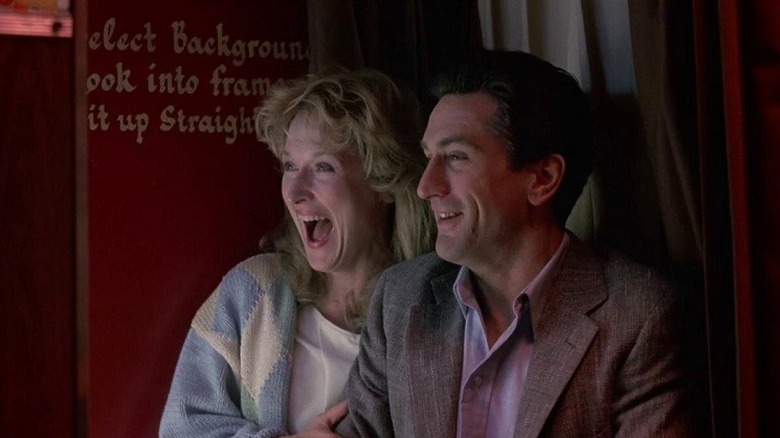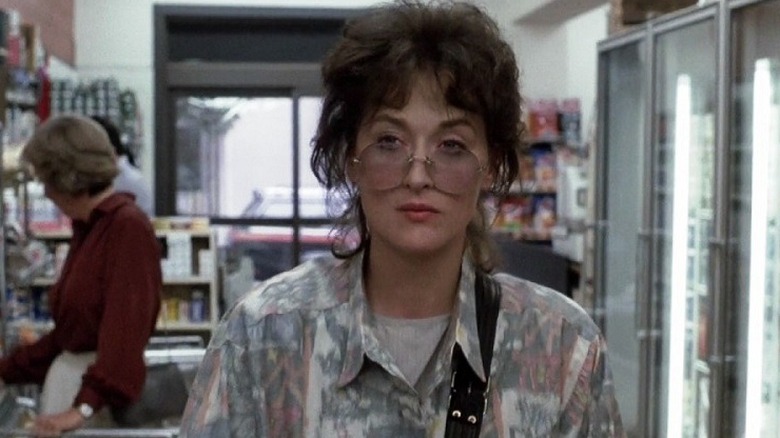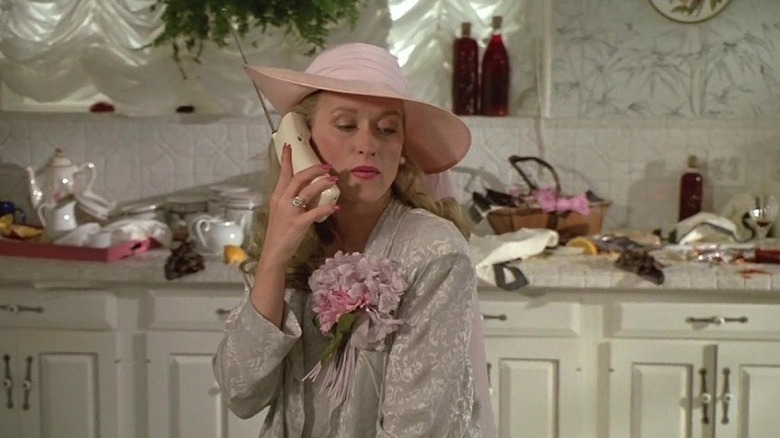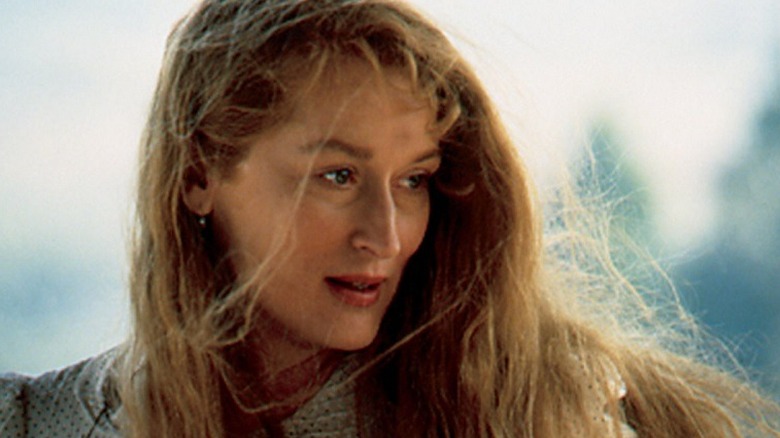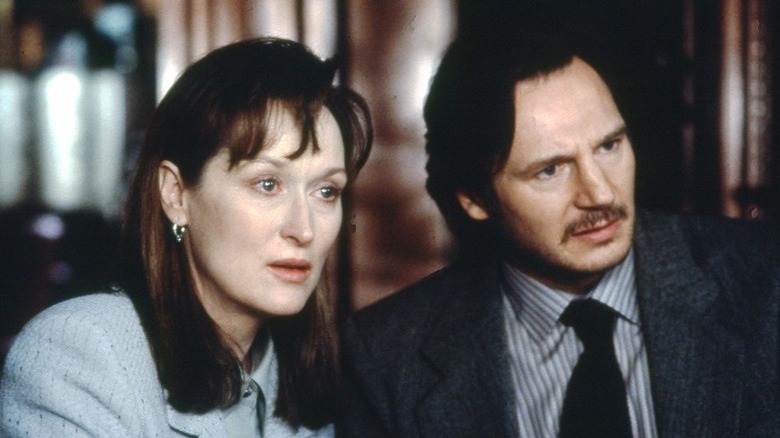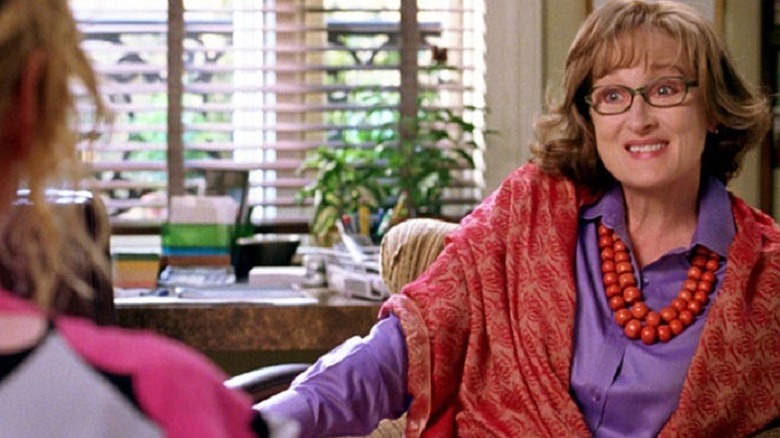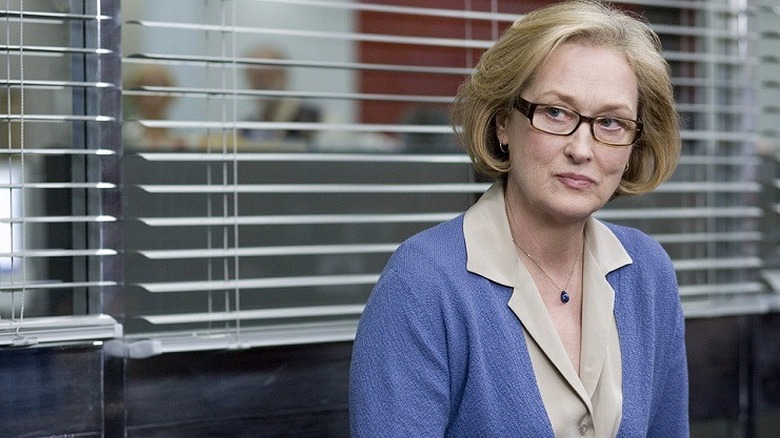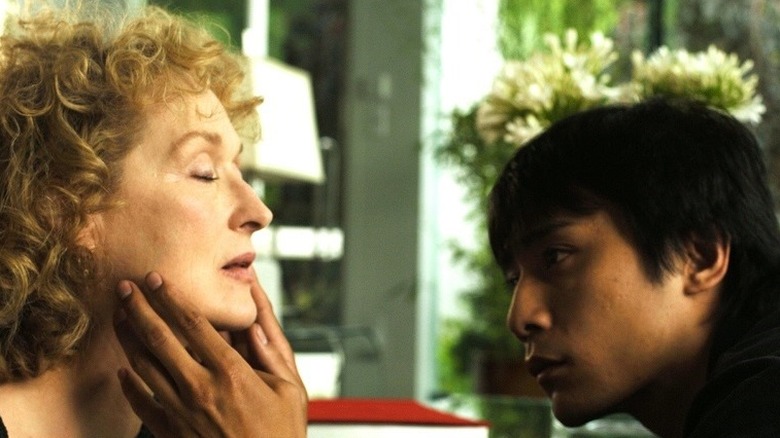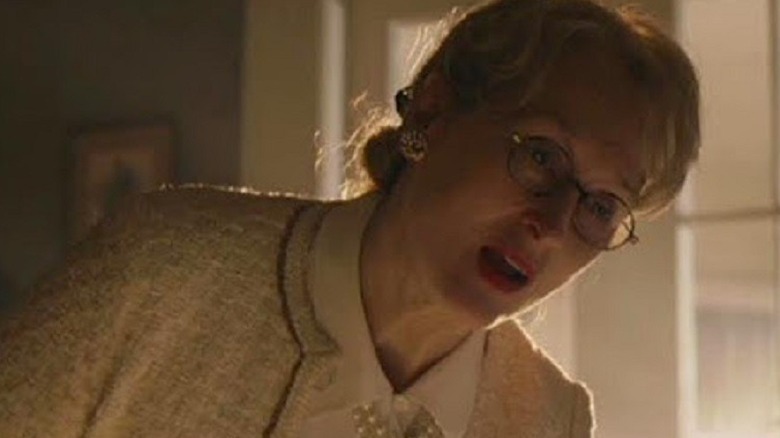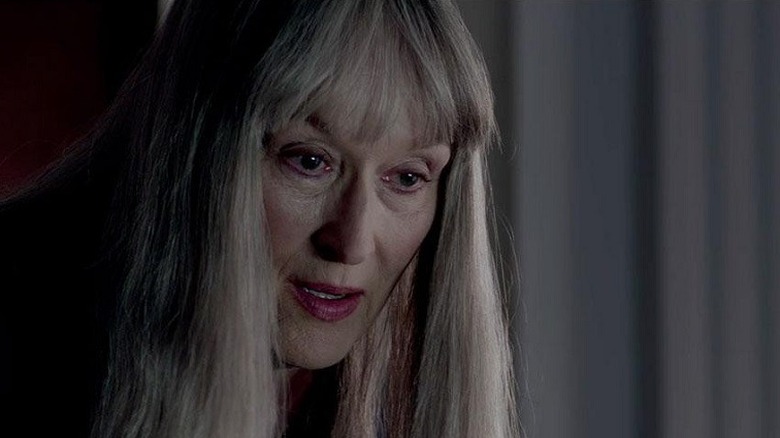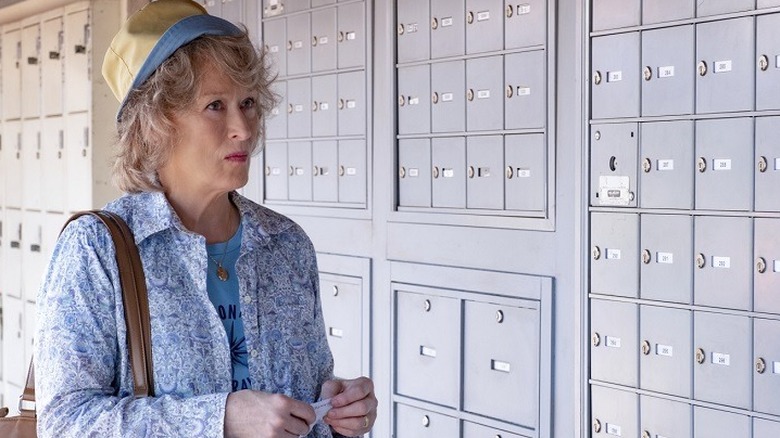Roles Meryl Streep Should Have Said No To
Meryl Streep is considered by many to be the world's greatest living actress. She's won three Academy Awards and has been nominated a record-setting 21 times for the Oscar. She's won three Emmy awards and nine Golden Globes. Known for the fastidious preparation she uses to immerse herself in roles, she has made her versatility as an actress her trademark.
Streep has been nominated for 21 Oscars, winning three times for "Kramer vs. Kramer," "Sophie's Choice" and "The Iron Lady," but has also made her mark in instant classics like the genre-bending "Adaptation," the edgy "Postcards From The Edge" and "The Devil Wears Prada," and musicals like "Mamma Mia!"
However, even an actress of Streep's stature doesn't always land the best roles. A working actress has to keep working, so sometimes Streep has had to choose from less-than-ideal, perhaps even incomplete, scripts. Other times, things that seemed like a good idea may have been scuttled by poor editing, studio interference, or a director who has another film in their head.
While an astute fan might notice that many of Streep's poorly-reviewed films have been fairly recent, some of that could be due to aging actresses having a harder and harder time finding challenging material in Hollywood. That said, let's check out roles that even the great Meryl Streep couldn't redeem.
Falling In Love (1984)
In the early '80s, Meryl Streep was busting out, having made "Silkwood" and "Sophie's Choice" back-to-back — the first earning her an Oscar nomination and the other a win. In 1984, she re-teamed with "Deer Hunter" co-star Robert DeNiro for "Falling In Love," about a man and a woman who "meet cute" in a bookstore and gradually fall in love, despite being married to other people. The $12 million film didn't even earn that back.
Roger Ebert called out the film's "banal dialogue" and "manipulative and shameless ending," ultimately declaring it the "definitive example of good performances in a bad movie." Paul Attansio of the Washington Post declared that director "Ulu Grosbard directs with the pace of a burial march." He said Streep just tried too hard in the movie: " She glances down, glances off camera, hooks an eyebrow, laughs uncomfortably, plays with her nose, but the close-up just won't go away." His greatest venom, however, was reserved for screenwriter Michael Cristofer, noting the "mumbling, inarticulate screenplay." This one probably seemed like a good idea at the time, but its minimalist approach wasted the talents of two of the greatest actors of all time, which feels like it should be a criminal offense of some sort.
Heartburn (1986)
The 1986 film "Heartburn" was written by Nora Ephron, directed by Mike Nichols, and starred Streep, Jack Nicholson and Jeff Daniels. What could go wrong? As it turns out, a lot.
The story was a film-a-clef written by Ephron about the failure of her marriage to investigative journalist Carl Bernstein, who had cheated on her. With a $20 million budget, it barely made back $25 million at the box office.
Gene Siskel answered the question of how it could fail: "Easy. Ephron delivered an incredibly flimsy script based on her novel about her former husband's repeated infidelity during their marriage. Nicholson isn't given a character to play. He just lumbers onto the screen and cheats off camera. Streep's character is a whimpering 'please come back' type, when we know in real life that Ephron fought back at her husband by writing a wickedly funny book ... we have a movie that gives us one cipher and one illogical character in a marriage that consequently means nothing to us."
William Wolf of Gannet News Service said: "Despite engaging performances by Meryl Streep and Jack Nicholson, the screen adaptation of Nora Ephron's popular novel is shallow and wan." Once again, Streep was let down by a thin plot and bad screenplay for a film made by people who should have known better.
She-Devil (1989)
Back in 1989, Roseanne Barr was the hottest talent in Hollywood; her TV show "Roseanne" was at or near the top the ratings, she had returned an "All in the Family"-like vibe of working class honesty to the sitcom, and she was an in-demand stand-up comic as well. Hollywood came calling with "She-Devil," but this was a time when TV stars stayed on TV and movie stars stayed in movies and rarely did they intermingle. So, like Shelley Long ("Troop Beverly Hills"), Bill Cosby ("Leonard Part 6"), David Caruso ("Jade") and others, audiences seemed out to punish her perceived hubris in stepping outside their boob tube.
Unfortunately, Streep would get assailed with major collateral damage. A vicious revenge fantasy with an improbable plot, "She-Devil" could have maybe at least become a cult classic if audiences gave it more of a fair shake. But even then, as Kathi Malo of The Sojourner noted, the film didn't even use Barr to full effect. "By neutralizing the intensity of [the Barr character's] anger, the filmmakers blow their entire plot."
Bruce C. Steele of Outweek was far more blunt, calling it "an inept, offensive mess of a comedy ... Streep proves that even she can be destroyed by bad direction: the shrill cartoonishness she's been given to play falls flat in scene after scene." Steele ultimately dismissed it as a "paean to bad taste and exploitation."
The House Of The Spirits (1993)
1993's "The House Of The Spirits" seemed to be another sure thing: a multigenerational magical realist epic based on the novel by Isabel Allende with a star-studded cast. The result was one of the biggest flops of Streep's career, earning only $6 million back from a $40 million budget. There were a number of reasons why Streep might have regretted making this film. One of them was that in a film that was explicitly about Latinx characters, she and co-star Jeremy Irons were very obviously white. It's unlikely the film would have been made today with the same actors for this reason.
However, the film had many other problems. Stephen Hunter of the Baltimore Sun said "It's also a wretched paradox: a big budget, star-driven art film whose very elements subvert its ambitions and turn it into the thing it least wants to be — a listless '50s-style Hollywood melodrama." David Ansen of Newsweek said "The greatest actors in the world can't overcome a script that boils everything down to the Esperanto of cliche." Kenneth Turan of the Los Angeles Times simply says that it's "a misstep in the careers of pretty much everyone involved."
Before And After (1996)
1996's "Before And After" is part crime drama and part family melodrama. Co-starring Liam Neeson, it's about a family trying to protect their son from a charge of murder. Unlike most of Streep's better roles, where she is an active protagonist, virtually everything she does in this movie is reactive, especially as she opposes most of what Neeson tries to do.
Mike Clark of USA Today said "Despite Meryl Streep, Liam Neeson and the usually estimable Edward Furlong, this nonevent huffs and puffs to attain even the level of an ordinary motion picture." Roger Ebert of the Chicago Sun-Times said that it was "a long, slow slog through a story about a family crisis that is largely the fault of the family itself — especially the hot-tempered but loving father, who makes a series of crucial mistakes. The characters behave stupidly and pay a price for it. " Of Streep, he said that she "seems somehow too detached; her mind seems elsewhere, even during some of the most emotional moments." The role simply didn't have the typical heft that Streep does so well with.
Prime (2005)
Meryl Streep's descent into Jewish-mother shtick was at the core of her poorly-received film "Prime" in 2005. It barely made back its $22 million domestic budget. Playing a therapist with Uma Thurman's character as a client, she encourages Thurman's affair with a younger man until she realizes that it's her own son, an artist. Various shenanigans ensue as a result, with a variety of lies, betrayals, break-ups and make-ups.
William Arnold of the Seattle Post-Intelligencer said "it has the low-budget look and feel of an indie dating comedy — and not a very good one at that." He wondered: "As might be expected, Streep is excellent as the Jewish mom but the role is ultimately so slight that it seems well beneath her talent. Is this the only work the greatest movie actress of her generation can find these days?" Tasha Robinson of the AV Club said "Streep ... just can't stop compensating. Her oy-vey-can-you-believe-the-kid-and-his-shiksa performance is all studied mannerisms with no real heartt."
Lions For Lambs (2007)
The 2007 war drama "Lions For Lambs" featured a timely message, was directed and starred Robert Redford, and paired him and Streep alongside Tom Cruise. Despite that mega-wattage, it limped to a $15 finish at the box office with a $35 million budget. What happened? Redford made a film that he hoped would get audiences to ask a lot of questions, but most critics felt that they had instead been given a lecture.
Mike Massie of Gone With The Twins said said "Strong acting and sharply scripted characters are unable to disguise Redford's opinionated brand of current events, which often teeters dangerously close to Army recruitment." Ella Taylor of the L.A. Weekly said that the movie was "Less a war drama than a set of dueling position papers." Peter Bradshaw of The Guardian said it was "a muddled and pompous film about America's war on terror, which seeks to counter neo-con belligerence with a mixture of injured sensitivity and a shrill, pre-emptive patriotism of its own" and added: "whingey, snuffly Meryl Streep is supremely annoying." Claudia Puig of USA Today stated it plainly: "the film feels preachy and falls flat as entertainment." Streep's involvement probably made sense at the time, but this blip in her career is barely remembered now.
Dark Matter (2007)
Also released in 2007, the independent film "Dark Matter" was based on a real-life tragedy where a Chinese graduate student shot his old professor, his rival, and other colleagues at Iowa State University before turning the gun upon himself. Ye Liu played a graduate student named Liu Xing, a curious, likable young man with bold ideas about physics and cosmology, but a great deal of naivete when it came to university politics.
Reyhan Harmanci of the SF Gate said that a big problem with the film was that while it was based on a real incident, the end result didn't make a lot of sense. The character in the film was likable and funny, and his "extreme reaction to [the] dismissal of his doctoral thesis is at best unbelievable, at worst unwatchable. Using excessive sweat as a stand-in for character development, Xing unravels at breakneck speed." The student Liu Xing was based on was an introverted, bitter loner.
Streep played a university donor named Joanna Silver who "adopts" Xing early in the film. Harmanci notes that "Her character often doesn't seem necessary, but Streep's acting is superb: Silver skirts the line between being a genuine friend to Xing and indulging in orientalist stereotypes, making Chinese culture one of her hobbies."
Evening (2007)
The poster was little more than a simple image and a listing of names — for good reason. In 2007, it would be nearly impossible to assemble a more impressive cast of actresses than Claire Danes, Toni Collette, Vanessa Redgrave, Natasha Richardson and Glenn Close. How could Streep have possibly said no?
Unfortunately, she didn't, and this multigenerational story about a group of women, regrets, and secret romances landed in theaters with a thud. It was about the friendship between two college friends, involved death and weddings and flashbacks and regrets, and even offered both Redgrave and Streep the opportunity to act alongside their real-life daughters.
Richard Schickel of Time noted the female star power of the movie, asking "Wow, you might think, how bad can that be? To which one responds, after two lugubrious hours in their company, really awful. Rarely have so many gifted women labored so tastefully to bring forth such a wee, lock-jawed mouse." He blamed the screenwriters as well as director Lajos Koltai, saying "One also imagines him being slightly afraid of his high-wattage cast, incapable of molding them into an ensemble." Of Streep, he said only she "hints at the sort of brisk, no-nonsense playing that might have rescued the movie." Derek Malcolm of the London Evening Standard agreed regarding the script, saying "The performances are oddly muted, as if the screenplay refuses to allow a fine cast full rein."
The Giver (2014)
This Phillip Noyce-directed adaptation of the beloved Lois Lowry book that many had considered unfilmable for twenty years was a rare detour into science-fiction for Streep. The problem with the film, which co-starred Jeff Daniels, is that it looked an awful lot like a number of other dystopian, young adult sci-fi films of the era. Mark Kermode of The Guardian said "it just looks like a low-rent mishmash of 'Divergent' and 'The Hunger Games,' recycling riffs from 'Logan's Run' with sets and costumes lifted from 'Bill and Ted's Bogus Journey.'"
This was a fairly cliched role for someone of Streep's stature, as the society in the story had eliminated pain at the cost of wiping out all human emotion with the exception of one person, who took on the community's pain and memories as his burden. Kermode said she was "struggling to inject a note of gravitas into the increasingly exasperating nonsense."
Chris McCoy of the Memphis Flyer got at the heart of the problem: "For a film that claims to champion colorful nonconformity, 'The Giver' is depressingly drab." Complex's David Ehrlich piled on, saying "The fatal irony at the heart of 'The Giver' is too hilariously blatant to ignore: here is a dystopian teen drama about the perils of sameness that feels exactly like all of the other movies in its increasingly crowded genre."
The Laundromat (2019)
This Steven Soderbergh Netflix drama was a well-intentioned, ambitious, high-concept attempt at explaining the Panama Papers, a highly unscrupulous international scheme that made scammers filthy rich at the expense of ordinary, trusting people. Soderbergh attempted to dive into these dense waters by following the stories of several people impacted by money-laundering shell corporations, the whole thing "narrated" by two gleeful scumbags (played by Gary Oldman and Antonio Banderas) who had made out like bandits.
Streep was cast as an older woman whose husband drowned in a boating accident — but the boat company's insurance was tied to these international schemers through a nauseating labyrinth of shell corporations, leaving it impossible to collect. Streep's performance was very impressive, including a powerful ending where she reveals that she had been playing a second character all along in plain sight — then strips off the facade in one long take, stepping out of character and appealing for reform as Streep herself, striking a pose like the Statue of Liberty.
It was the kind of epic, complicated monologue that you could only imagine Meryl Streep pulling off. But was it wasted on a movie that didn't seem to be nearly as competent elsewhere?
In Their Own League's Nicole Ackman said the movie "clearly plays off of the style of movies like 'The Big Short,' but unfortunately is nowhere near its clarity, thoroughness, or artistry." Vulturehound's Andrew Gaudion said "It's different and may work for some, but ultimately 'The Laundromat' drops the ball as a piece of cinema that strives to make a complicated situation feel tangible, devastating and perhaps most importantly, human."
The end of the film was particularly polarizing. When Streep revealed that she was not only playing the widow Ellen, but also Elena, a secretary at a law office in Panama that aided the money laundering, the artifice struck some as too precious for its own good. Alonso Duralde of The Wrap said "Whatever emotional resonance Streep achieves as an angry widow is undone by the decision to cast her as a Mossack Fonseca secretary, complete with enormous fake nose and ridiculous Spanish voice. It's a jarring bit of show-offery from a performer who should be above such flash."

